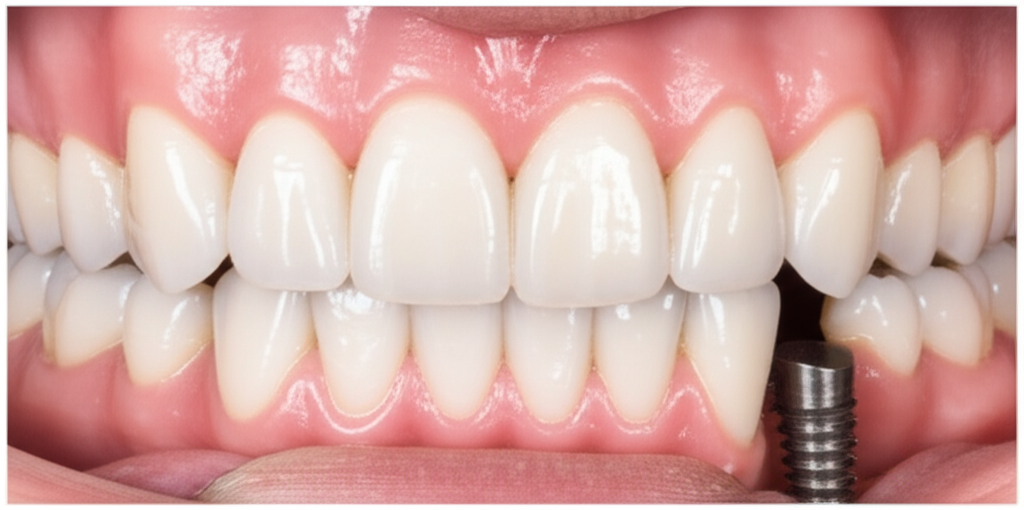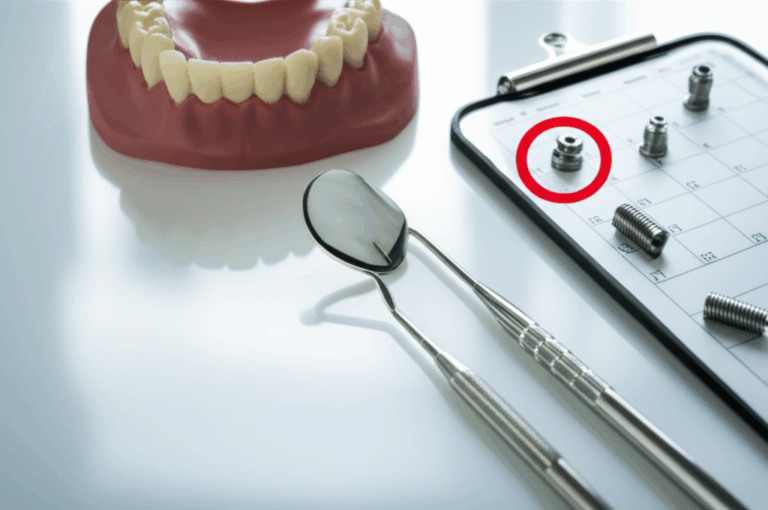
Dental Implants vs. Veneers: What’s the Real Difference? A Simple Guide to Choosing Your Best Dental Solution
Ever stood in front of the mirror running your tongue over a chipped tooth, or wondered how to fix that empty space where a tooth used to be? Maybe your dentist talked about veneers or dental implants—but it all sounds kind of confusing. If you’ve searched “what’s the difference between dental implants and veneers?” or thought, “Which is best for my smile and budget?”—you’re in the right place. Let’s break things down in plain English, step by step.
In This Article
- What Are Dental Implants?
- What Are Dental Veneers?
- Dental Implants vs. Veneers: The Key Differences
- How to Decide: Which Option Fits You Best?
- Frequently Asked Questions
- Your Healthy Smile Takeaway
What Are Dental Implants?
Bringing Back What’s Missing—From Root to Tip
Imagine you’re fixing an old chair. If one leg is missing, just covering the top won’t help—you need to rebuild the leg itself. That’s exactly what dental implants do for missing teeth. Instead of just hiding an issue, implants give you a new tooth root, holding a fake tooth right in your jawbone.
What’s in a Dental Implant?
- Titanium Post: A small metal screw that acts like your tooth root, set into your jaw.
- Abutment: The connector piece that holds your new tooth (the crown) to the post.
- Crown: The part that looks and works like your own tooth.
Why Pick an Implant?
Dental implants are not just about appearance. They are a practical choice, made to:
- Let you eat and talk like you used to.
- Stop bone loss in your jaw and keep your face shape normal.
- Stop nearby teeth from moving into the empty space.
If you have a missing tooth—or even a few—implants can help you get back the confidence to eat and smile without worry.
Getting an Implant: What’s It Like?
Getting a dental implant is not something done in one visit. Here’s how it usually goes:
Who’s a Good Fit for Implants?
People who are right for implants usually:
- Have one or more missing teeth.
- Have healthy gums and enough bone to support the implant (but a bone graft can help if you don’t).
- Don’t smoke, or want to quit.
- Take care of their teeth and overall health.
If you’re missing teeth, talk to a dental implant expert or your local dentist to see if this could work for you.
What Are Dental Veneers?
Making Your Teeth Look Brand New
Ever wanted a fast “smile upgrade”? That’s what dental veneers do. Instead of replacing teeth, veneers are thin, strong shells, gently glued to the front of your real teeth to cover stains, chips, or gaps.
Veneers: What They’re Made Of
- Porcelain Veneers: The best quality—strong, don’t stain easily, and look very natural.
- Composite Resin Veneers: Cheaper and easy to fix, but don’t last as long.
Some brands, like Lumineers, say you need even less tooth filed down. No matter which you pick, the main idea is the same.
Why Get Veneers?
Veneers are a good fix for:
- Teeth that won’t get white no matter how much you clean them.
- Chips, small breaks, or worn teeth.
- Spaces between teeth.
- Slightly crooked or odd-shaped teeth.
Think of them like a filter for your smile—only in real life.
The Veneer Process, Step by Step
Are Veneers Right for You?
Veneers aren’t for everyone. You can get them if you:
- Have healthy teeth with no big cavities or fillings.
- Want to hide cosmetic issues—not replace missing teeth.
- Keep up with brushing, flossing, and dentist visits.
- Don’t grind your teeth a lot (this can crack veneers).
Not sure? Talk honestly with your dentist about your teeth and what you want to change.
Dental Implants vs. Veneers: The Key Differences
Finding the Best Fit for Your Problem
Let’s face it—not every fix is right for every person. To help you choose, here’s a simple side-by-side list. Think of it as your dental cheat sheet.
Purpose:
- Implants: Replace missing or badly hurt teeth—both root and top part.
- Veneers: Hide or improve teeth you still have—purely for looks.
Procedure & How Involved:
- Implants: Need surgery, takes a few steps, and requires months to finish.
- Veneers: Not much drilling, usually just 2-3 appointments.
Effect on Other Teeth:
- Implants: Don’t bother nearby teeth.
- Veneers: Need a tiny layer of enamel filed off your real tooth.
How Long They Last:
- Implants: Often last a lifetime with care; the crown on top may need changing in 10-15 years.
- Veneers: Porcelain can last 10-15 years, composite ones for 5-7 years.
Recovery:
- Implants: You’ll need months to heal completely.
- Veneers: Little to no recovery; back to normal the same day.
Price:
- Implants: More expensive up front (usually $3,000-$6,000 per tooth), but might last forever.
- Veneers: Less per tooth ($900-$2,500 for porcelain; $250-$1,500 for composite), but you might need several for a big change.
Insurance:
- Implants: Sometimes covered if medically needed.
- Veneers: Hardly ever covered; just for looks.
Jawbone Health:
- Implants: Stop bone loss and keep jaw strong.
- Veneers: Don’t help or hurt your jawbone.
Quick Comparison Table
| Feature | Dental Implants | Dental Veneers |
|---|---|---|
| Main Purpose | Replace missing teeth | Make teeth look better |
| Procedure | Surgery, several steps | Not surgery, only slight filing |
| Avg. Longevity | 20+ years (implant post) | 10-15 years (porcelain) |
| Cost (per tooth) | $3,000 – $6,000+ | $900 – $2,500 (porcelain) |
| Insurance | Sometimes covered | Hardly ever covered |
| Impact on Bone | Stops bone loss | No effect |
| Reversibility | Not reversible | Not reversible |
| Best For | Missing, very damaged teeth | Stains, chips, minor gaps/crookedness |
How to Decide: Which Option Fits YOU Best?
Easy Advice for Everyday People
1. What’s Your Main Goal?
- Missing teeth? Implants are meant for that.
- Healthy but ugly teeth? Veneers can change how they look.
2. How’s Your Overall Dental Health?
- Good gums and bone? Likely good for implants.
- Solid teeth? You can probably get veneers.
3. Money and Ongoing Care?
- Implants cost more at first, but you won’t need to redo them much.
- Veneers cost less per tooth, but you’ll replace them every 10-15 years.
4. How Much Time Do You Have?
- Implants take patience. They need planning, healing, and can last months.
- Veneers are quicker. You can have a new smile in weeks.
5. Do You Have Insurance?
Check with your insurer. Implants may be partly covered for medical needs, but almost never for looks. Veneers are usually not covered.
6. Good Questions to Ask Your Dentist:
- Am I a good fit for both options?
- Will I need other work (like bone building, gum treatment) first?
- What’s the real price?
- What will I need to do to take care of them?
Your dentist’s advice matters—everyone’s teeth and wishes are different. For more cool choices, you can even ask about new digital dental lab tech or custom implants from a special implant dental laboratory.
Frequently Asked Questions: Dental Implants vs. Veneers
Simple Answers for Real Worries
Can you get both dental implants and veneers?
Yes! If you’re missing some teeth (need implants) and have others that are chipped or stained (need veneers), your dentist can mix both.
Do implants feel or look real?
Most people can’t even tell the difference! Implants work and look almost just like real teeth, especially if the crown is made by a good crown and bridge lab.
Are veneers easy to spot?
Great veneers are made to match your other teeth. If done well, most people can’t notice them.
How long do implants and veneers last?
If you look after them, implant posts can last all your life. The crown on top usually needs changing every 10-15 years. Porcelain veneers last about 10-15 years; composite ones less.
Any risks?
- Implants: For most people, it’s not hard, but sometimes you can get an infection, nerve pain, or the body may not like the implant.
- Veneers: They can chip, stain, you might feel more sensitive, or (if you stop looking after your teeth) the real tooth underneath could decay.
Can either choice be undone?
No—they’re both forever. Implants are fixed in bone, and veneers mean a thin layer of real enamel is taken away and can’t be put back.
Your Healthy Smile Takeaway
A Quick, Clear Wrap-up!
Dental implants and veneers are both great ways to help you smile with more confidence—but they’re for different people and problems:
- Pick Implants If:
You have missing teeth, want a strong jaw, and don’t mind waiting for a long-lasting fix.
- Pick Veneers If:
Your teeth aren’t missing, just need to look better fast, and your teeth underneath are healthy.
In Short:
- Implants = Lasting solution, new tooth, keeps jaw strong, great function.
- Veneers = Fast, cosmetic fix for teeth that bother you by how they look.
Quick Tips:
- Write down your smile goals and worries before seeing the dentist.
- Ask for a simple explanation and some “before and after” pictures of real cases.
- Don’t rush—take your time to feel good about whatever you pick.
Why It Matters:
Getting your smile fixed can help you every day. Whether that’s biting into an apple or smiling in selfies, it’s more than just looks—it’s about how you feel.
When you’re ready, get a personal talk with your dentist. A good dentist will listen to your story and help pick what fits your life—not just your teeth.
References and Sources You Can Trust:
- American Dental Association (ADA)
- American Academy of Cosmetic Dentistry (AACD)
- Real dental studies and lots of dental office know-how
Remember:
Choosing between dental implants and veneers is not the same for everyone. Your needs, health, and what you want from your smile should help you decide. Let this guide help you start your journey to a happier, more confident dental future.
If you want to learn more about how cool dental labs help make new smiles, see how a dental ceramics lab works behind the scenes.
Here’s to your healthiest, happiest smile—one smart step at a time.








